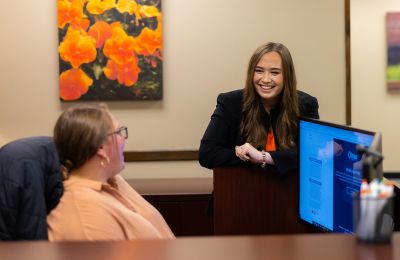Committed to providing students a high-quality, affordable education, the University of Tennessee, Knoxville, offers several scholarship programs for incoming in-state, out-of-state, international, and transfer students.
The newest of these programs—the Tri-Star Scholarship Program—consists of a trio of scholarships specifically for Tennessee residents looking to become a part of the Volunteer community.
These scholarships are already making an impact on students’ lives.
UT Promise
“For my freshman year I was looking for scholarships on my own,” says Aubrey Caster, a sophomore journalism major from Murfreesboro, Tennessee. “I was taking out loans. My mom had even taken out loans to help me.”
Then Caster learned about UT Promise, a last-dollar scholarship for students whose family household income falls below $50,000. After all other financial aid or scholarship money is applied, UT Promise covers whatever remains of tuition and mandatory fees.
“It was a huge help,” Caster says.
Beyond supporting students financially, the program pairs them with a mentor—a faculty or staff member who serves as a point of contact on campus. Caster was hesitant at first, but after meeting his mentor he was excited to learn about resources and opportunities to gain hands-on experience later on.
As part of the UT Promise Scholarship, students contribute eight service hours a semester to community organizations. Caster packaged and distributed food boxes for Feed America and was involved with a campus cleanup at a school in Murfreesboro.
“I was also a bell ringer for the Salvation Army—my mentor actually suggested that one,” he says.
UT Promise funds, like all university scholarships, can be applied to study abroad opportunities. Caster expects to participate in the College of Communication and Information’s Global Communications Scholars program in Sydney, Australia, next year.
Tennessee Pledge
Being the first in your family to attend college comes with a host of concerns and questions: How much harder are the classes? Who do I go to with questions? Will I fit in?
On top of the academic and social transition, many first-generation students are left worrying about the cost.
For Keely Williams of Knoxville, the Tennessee Pledge Scholarship—available to admitted first-year students with a family income of $40,000 or less—made the difference in being able to attend UT and stay to graduation. Williams graduated in 2020 with a degree in psychology and is now pursuing a master’s degree in social work.
“Without it, I don’t think I would’ve stayed in school,” says Williams, who was also a recipient of the HOPE and Regal Scholarships, Pell Grants, and the Tennessee Student Assistance Award. “I came out of college without any loans.”
Also crucial to Williams’s journey at UT was the mentorship she received from a staff member in the Academic Success Center who helped her transition to UT the summer after her senior year of high school. He later helped her find internship and service opportunities that boosted her resume and gave her a clearer picture of her career path.
Flagship
Students at 38 Tennessee public high schools qualify for the Flagship Scholarship, which, combined with the HOPE scholarship, covers eight semesters of tuition and mandatory fees for first-time first-year students.
Brakala Sims, who graduated from Tyner Academy in Chattanooga, Tennessee, and is studying kinesiology at UT, admits that she wouldn’t have been able to pursue higher education without the scholarship she received. “I wouldn’t be here. Because of this scholarship, I will give my all to Tennessee.”
In 2020, the university expanded the program to include Cane Ridge High School in Antioch; Kenwood High School, Northeast High School, and West Creek High School in Clarksville; Central High School in Knoxville; and Overton High School, Southwind High School, and Whitehaven High School in Memphis.
“It’s a complete difference maker for our families,” said Central High School Principal Andrew Brown after university officials surprised students with admissions letters. “It truly is the difference in having the opportunity to go to college or possibly not.”
More information about the criteria for the Tri-Star Scholarship Program is available on the One Stop Student Services website, along with information about other scholarship offerings at UT.







